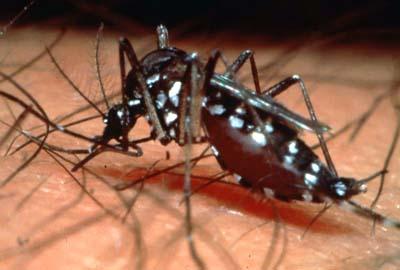The Aedes mosquito, with the scientific name Aedes aegypti or Stegomyia aegypti is the main infectious carrier, or vector, of the dengue fever virus and can also carry other viruses such as the similarly infamous yellow fever virus.
Dengue virus presents a growing threat to public health in the developing world. Four major serotypes of dengue virus have been characterized, and epidemiological evidence shows that dengue hemorrhagic fever (DHF), the more serious manifestation of the disease, occurs more frequently upon reinfection with a second serotype.
Primary infection may be asymptomatic or may result in dengue fever. This is generally a self-limiting febrile illness which occurs after a 4-8 day incubation period. It has symptoms such as fever, aches and arthralgia (pain in the joints) which can progress to arthritis (inflammation of the joints), myositis (inflammation of muscle tissue) and a discrete macular or maculopapular rash. In this situation clinical differentiation from other viral illnesses may not be possible, recovery is rapid, and need for supportive treatment is minimal. (NCBI)
Dengue haemorrhagic fever (DHF) is a potentially deadly complication. The incubation period is unknown but is likely to be similar to that of dengue fever. Dengue hemorrhagic fever commences with high fever and many of the symptoms of dengue fever, but with extreme lethargy and drowsiness. The patient has increased vascular permeability and abnormal homeostasis (homeostasis is the maintenance of equilibrium, or constant conditions, in a biological system) that can lead to hypovolemia (abnormal decrease in blood volume) and hypotension (drop in blood pressure), and in severe cases, result in hypovolemic shock (Shock due to a decrease in blood volume) often complicated by severe internal bleeding.
Dengue shock syndrome (DSS) results from leakage of plasma into the extravascular compartment. Rapid and poor volume pulse, hypotension, cold extremities, and restlessness occur. In addition to the plasma leakage, which is the result of generalized vasculitis, disseminated intravascular coagulation is present. Dengue shock syndrome is usually a progression of dengue haemorrhagic fever and is often fatal.
See distribution map here!
http://axisoflogic.com/artman/publish/Article_25106.shtml
